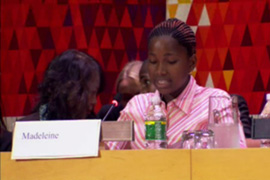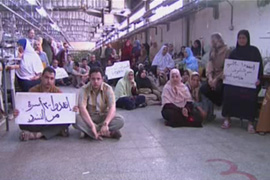
The Global Gag Rule
The impact of US abortion policy on family planning in developing countries.
 |
| Sanda Ojiambo, the regional head of the International Planned Parenthood Federation |
It is widely accepted that the quality of life in less developed countries would be greatly improved by better family planning. Demand for birth control has been rising, but in the poorest countries, needs just are not being met.
Access to contraceptives in places like Africa is almost entirely dependent on foreign aid namely, funding from the US.
But these services have been put at risk, because of a law first passed by Ronald Reagan, and reinstated by George Bush in 2001.
The ‘Global Gag Rule’ as it is known prevents overseas organisations from receiving a single cent, if they offer or promote abortion as a family planning option. The aim was to reduce abortions worldwide but critics say it does the very opposite.
Though Congress has recently voted to partially reverse the ban, it is widely assumed that Bush will veto the ruling.
Shiulie Ghosh is joined from Kenya by Sanda Ojiambo, the regional head of the International Planned Parenthood Federation.
Comfort Women
 |
| Lu Man Mei – fighting for compensation |
Around 200,000 women were forced into sexual slavery by the Japanese army during World War II.
Known as ‘comfort women’, young girls across the Far East were coerced into military brothels.
Japan says it has shown enough remorse over the issue, but others do not agree. A US congressional committee has just passed a resolution calling for a formal acknowledgement of the abuse, and an official apology.
So far, the Japanese prime minister has refused to comment.
One former comfort woman, Lu Man Mei, is among those fighting for compensation from the Japanese government. She spoke of her ordeal to Everywoman’s Ju Lin Ong.
Girls Child Soldiers – An Everywoman exclusive
 |
| Madeleine told a UN meeting in New York about her experiences as a child soldier |
One of the ugliest legacies of wars across the world is the use of child soldiers. Human rights groups say up to 300,000 children have been forced to join armies and the militias. They wield guns, act as spies, or are take part in suicide missions.
In the Democratic Republic of Congo, thousands of children were forced on pain of death to enlist during the recent civil war. Several boy soldiers have spoken of their ordeal, but very little has been heard from the girl soldiers until now.
A courageous 15-year-old recently spoke out at a United Nations meeting in New York. She spoke exclusively to Everywoman.
Egypt Update
 |
| Egypt’s striking textile workers |
You may remember a few weeks ago Everywoman highlighted the plight of the women textile workers in Egypt who were on strike. They were occupying the Mansoura Espania factory to protest against their poor pay and working conditions.
The sit-in lasted some 3 months but the courage and persistence of these remarkable women has finally paid off as it looks like they have won their fight. Everywoman reports on this story.
Watch this episode of Everywoman here:
Part 1:
Part 2:
This episode of Everywoman aired from July 06, 2007.
To contact us click on ‘Send your feedback’ at the top of the page
Watch Al Jazeera English programmes on YouTube
Join our debates on the Your Views page